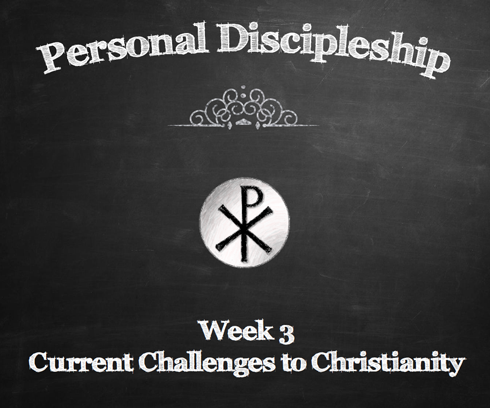
Click on the images inside this file to link to the online resources. (You may need to adjust your browser settings to allow the links to work, or open it in iBooks, or save it to your desktop and open it with Acrobat Reader.)
Have you ever been blindsided by a hostile comment about your faith? For whatever reasons, someone has a chip on their shoulder about Christians. Maybe you weren’t even talking about anything spiritual, and they let go a pejorative that hits you like ice water in the face. If they’re angry and intelligent, you might hear a diatribe that is well articulated and seems to challenge your Christian worldview in a really disturbing way.
If you’ve been a Christian for any length of time, welcome to the real world. Skepticism is nothing new.
“Blessed are you when they revile and persecute you, and say all kinds of evil against you falsely for My sake. Rejoice and be exceedingly glad, for great is your reward in heaven, for so they persecuted the prophets who were before you.”
Matthew 5:11,12 (NKJV)
Being on the receiving end of mocking and ridicule is bad enough, but how do you respond to the underlying challenge?
Personal discipleship is more than a process—it’s a lane to drive in when your faith is challenged. One of the (many) reasons that ice water in the face feels so cold is that we are poorly prepared to graciously address the underlying objections. Not just poorly prepared in terms of having a pithy response, but poorly prepared to engage in a manner that is gentle and respectful. Bobby Conway says the purpose of apologetics is to remove barriers to the Christian faith. Apologetics is not about winning arguments. Got it. But we have little chance of presenting Christ in a favorable light if we don’t know where people are coming from—emotionally and intellectually.
Dr. Norman Geisler gave an interview to Apologetics315 in which he made some statements that get at the heart of the matter. Geisler is a prolific author, systematic theologian, philosopher, and professor. He has founded two evangelical seminaries and was the chief architect behind the Chicago Statement on Biblical Inerrancy. He is a standard-bearer for conservative Christian doctrine.
“I learned a lot from all skeptics. I tell my students that I spend most of my time studying and teaching what I don’t believe, namely the history of philosophy, and I’m writing a book on it now, The History of Philosophy From a Christian Point of View. You have to have a knowledge of what’s going on, that’s the bread and butter, that’s the standing on the shoulders of giants. As someone said, ‘You can learn more from the error of a great mind than you can the truths of a small mind.’ Because, the error of a great mind is a significant error, and you learn a lot from significant errors. Furthermore, I would encourage reading atheists because when I see the fallacies, the flimsy grounds upon which they base their belief, it encourages me in my own faith. So, I don’t read Streams in the Desert, or Daily Bread for devotion, I read atheists. Because they’re encouraging Nietzsche, and Freud, and Fromm, and Feuerbach, and Schopenhauer, and all the great atheists. Because as I read them, I strengthen my own faith, I see how to answer the fallacies in their writings, and I’m able to do what the Bible tells me—to destroy arguments and every proud obstacle against the knowledge of God and bring every thought captive to Christ (2 Corinthians 10:5).”
So why study the skeptics? To encourage and strengthen your own faith, so that you can destroy arguments and proud obstacles to the knowledge and love of God. And always with gentleness and respect.



February 16th, 2015 at 5:49 pm
John, great post. Geisler is one of my favorite authors and teachers, I was privileged to take an Apologetics class he taught. We need to know what the skeptics are teaching in order to make effective counter arguments. David
LikeLike
February 18th, 2015 at 6:13 am
Thanks David. I heard the Apologetics315 interview some time ago and Geisler’s quote made a lasting impression. I have had the privilege of hearing him present several lectures at the National Conference on Christian Apologetics in Charlotte over the past two years. His scholarship is impressive and his doctrine is rock solid. (He is also very gracious to conference attendees.) Thanks for reblogging!
LikeLike
February 16th, 2015 at 5:53 pm
Reblogged this on Reasons For The Hope Blog and commented:
Part two on skeptics. If anyone wants to do great Christian apologetics you need to read Geisler. I highly recommend “I Don’t have Enough faith to be an atheist”. David
LikeLike